Health Questions Every Cat Owner Should Know
CatCuddles has rounded up the answers to a few frequently asked cat questions. Although most provide answers to health questions that every cat owner should know, these frequently asked cat questions also cover topics such as “why does my cat lick me so much?” and “why do cats eat grass?” Read on to find out the answers to some of the most frequently asked cat questions.
Can My Cat Get Rabies?
Any warm-blooded animal is capable of getting rabies, cats included. Rabid animals (such as skunks or bats) can carry the rabies virus, and if a cat is bitten, it will transfer the virus them. Rabies is dreaded by pet owners for good reason. Unless the rabies is treated within a certain window of time, it is often deadly to cats.
Rabies can incubate within a few days or a few months, severely affecting the cat’s central nervous system. In any case, once the symptoms arise, the prognosis is very poor. This is why the cat must be taken to the vet as soon as the cat is bitten by a wild animal. The vet will be able to assess whether the wild animal carried rabies or not.
Rabies symptoms in cats can manifest as foaming at the mouth, paralysis, seizures, and aggression. The only real protection is getting the rabies vaccine. The rabies vaccines must be frequently updated so one question to ask a vet is how often the rabies vaccination must be readministered to comply with state laws.
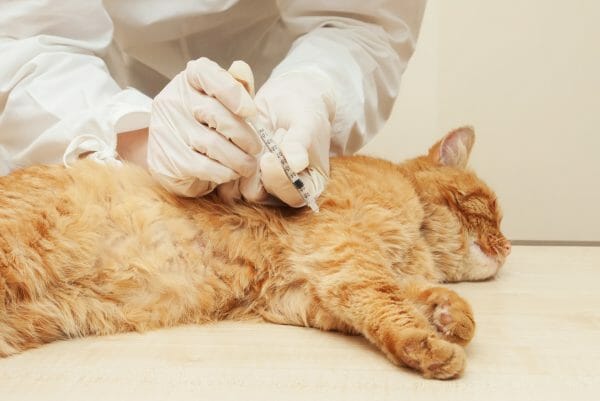
What Is Distemper in Cats?
Distemper is the less-frightening name for the feline panleukopenia virus, which also can go by the name of feline parvovirus. Distemper is an extremely contagious, often deadly, viral infection that works to infiltrate the blood cells of the body. It is usually caught by cats between 3 and 5 months old, so early vaccinations are highly recommended.
Cats can get distemper through direct contact with other infected animals. Therefore, kennels and shelters are considered rampant breeding grounds for the virus. The distemper virus can wreak havoc on the cat’s immunity, often leaving it open to the possibility of contracting more diseases. If parvo is suspected, a veterinarian intervention should be sought immediately.
What is Conjunctivitis in Cats?
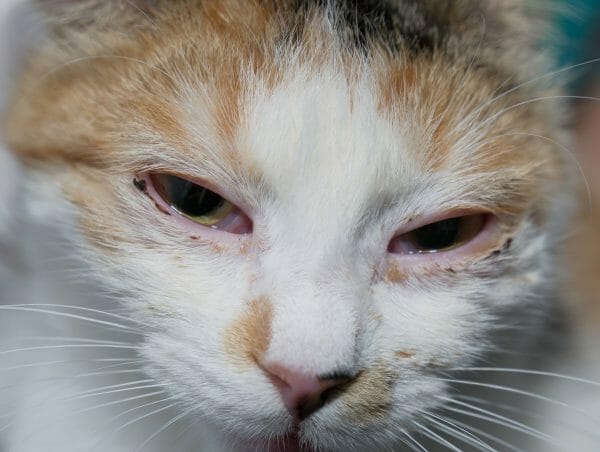
Conjunctivitis is a condition of the eye in which the outward lining of the eye becomes inflamed and sensitive through exposure to an irritant. Discharge or fluid build-up may be released from the eye as well.
Some common irritants that can cause conjunctivitis include:
- Environmental pollutants or allergens
- Viral infection
- Dry eye (bacterial infection)
Among the most frequently asked cat questions is “Can I treat my cat’s conjunctivitis at home?” The goods news is that there is normally a quick fix for conjunctivitis with the application of feline-approved ointment or eye drops. However, if the conjunctivitis worsens considerably, a vet should be seen.
Should I Be Worried if My Cat Vomits?
In most normal cases, a cat will vomit as a means of ridding its body of something inedible or food that did not agree with them. However, acute vomiting can occur at times. This is when the cat throws up until nothing except bile is left in the stomach.
Here are some of the less common reasons why cats experience acute vomiting:
- Allergic reaction
- Heat stroke
- Liver disease
- Intestinal obstruction
- Pancreatitis
- Feline Immunodeficiency Virus (FIV)
If a cat is continually vomiting or blood is seen intermixed with the vomit, a vet needs to be seen quickly.
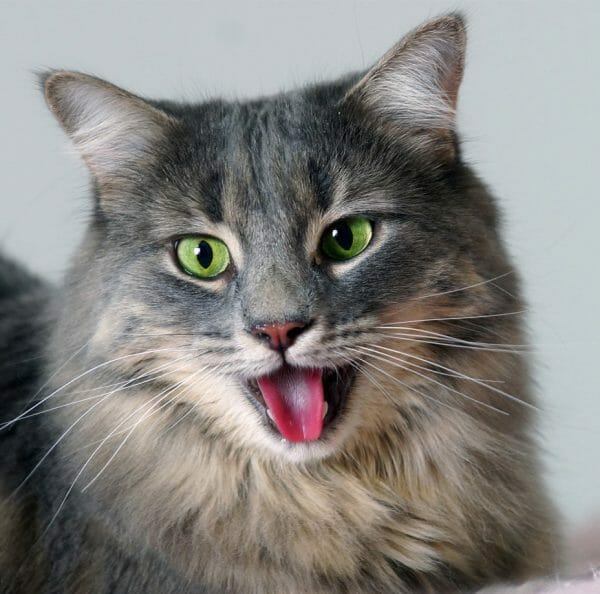
What Does it Mean When Cats Are Panting?
Unlike their canine counterparts, cats do not normally pant. Some of the only times when a cat can be seen strenuously panting is after heavy exercise or when cooling down from being in a hot environment. Aside from these times, frequent panting in a cat should be brought to the attention of the cat’s vet. Excessive panting can signal asthma, heartworm, or problems of the respiratory system.
What is the Gestation Period for Cats?
The average period of gestation for female cats that are pregnant is 9 weeks. In terms of days, this can range between 64 and 72 days. One frequently asked cat question is “how can I tell if my cat is pregnant?” Although the common signs of a pregnant cat are quite similar to those seen in humans (e.g., fluctuating appetite, nausea and vomiting, mood swings, etc.), it differs from cat to cat with some cats showing no symptoms at all. For this reason, a vet should be seen to confirm if pregnancy is taking place or not.

How Long Do Cats Stay in Heat?
Female cats that have not been spayed go in and out of heat throughout the year, making it very easy for them to get pregnant. Although some cats may be in heat for 2 to 3 weeks at a time, the average cat is in heat much less than this. In most cases, a female cat remains in heat for a few days or up to a week.
Why Does My Cat Lick Me?
Besides obvious grooming reasons, cats will often be seen licking themselves to calm their anxiety, cool themselves down, or remove parasites such as ticks or fleas. However, cats also often resort to licking their perplexed human owners. Just as an owner will pet the cat to show affection, the cat, in return, sometimes licks the human owners to return the favor. It is a sign to a cat’s owner that the cat feels loved, cared for, and happy. Some cats may lick their owners because it is the leftover influence of when they were kittens and nursing against their mother. In these cases, the licking may be mitigating some of the cat’s stress.
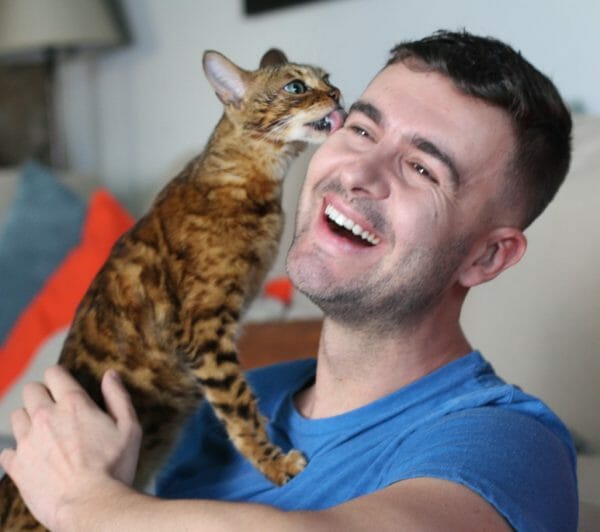
Why Do Cats Eat Grass?
One frequently asked cat question is why do cats seem to enjoy and want to eat grass. Cat owners should not be alarmed when they see their cat nibbling on grass blades. To the surprise of many, this is beneficial to the cat’s health in many ways.
- Folic acid, which is encapsulated in the juice within the grass, can help facilitate the production of oxygen and growth hormones.
- Grass can work to reduce indigestion in cats. The enzymes within the grass helps to break down the food or fur that is consumed.
- Grass can also help cleanse the digestive tract. If a cat has eaten something that is upsetting its stomach, grass can sometimes cause it to regurgitate the bad substances.
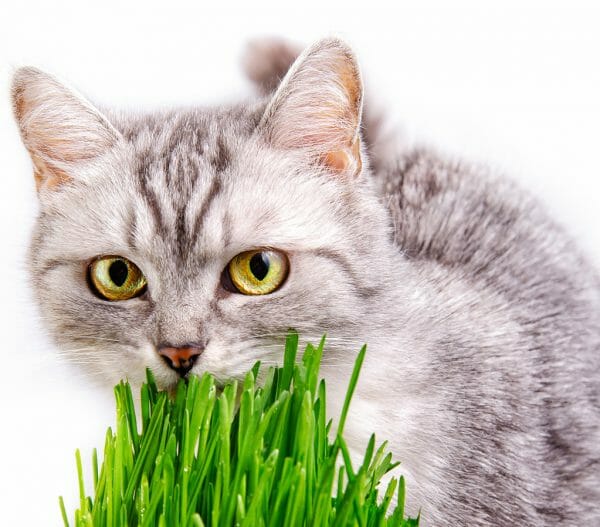
What Are Causes of Cat Constipation?
In most cases, constipation in cats is nothing to worry about. Many cats can become constipated simply by not drinking enough water or eating bad food.
However, some of the following causes may also be contributing to the constipation:
- Hyperthyroidism (the opposite of Hypothyroidism)
- Kidney disease
- Diabetes
- Infection
If one of these causes are present, additional side effects (such as pain while defecating, blood in the stool, or vomiting) may be seen as well. Black stool mixed with blood could be a sign of anemia. If the constipation does not go away, see a qualified vet about it.
What Causes Ear Mites in Cats?
Ear mites are parasites that love to snack on the lining of a cat’s inner ear. The mites would go undetected if it were not for the non-stop shaking of the head and clawing at the ears that cats do when ear mites are present.
Ear mites are a major annoyance to most cats, so owners can easily spot it and treat it. Most over-the-counter ear drops for ear mites work well in cats, but the best advice would be to see a vet beforehand, especially if this is the cat’s first time contracting ear mites.
If ear mite infestations are ignored, they could easily spread to other parts of the body, thereby significantly worsening the situation.
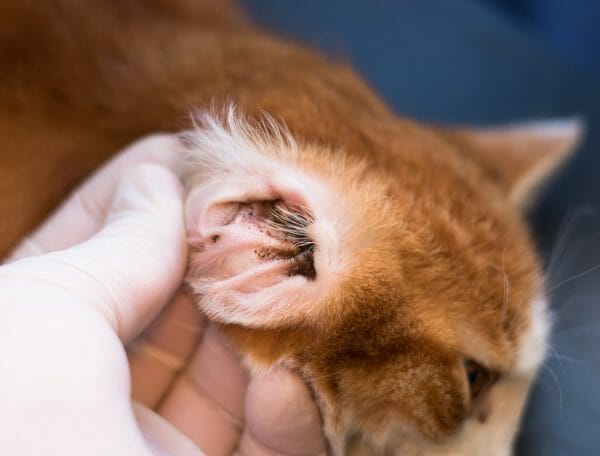
How Long Do Cats Live?
The longevity of a cat’s life is more or less contingent upon whether it is a wandering outdoor cat or a vaccinated indoor cat that is regularly taken to check-ups at the vet. On average, cats live about 10 to 17 years. In human years, this is 56 and 84, respectively. Some cats can live until 20 years or older, but the oldest cat on record lived 38 years and 3 days. That cat was named Cream Puff and her diet was very interesting! She was fed coffee with heavy cream for breakfast with broccoli, asparagus, eggs and even bacon. Converting cat years into human years puts their age into perspective. It is common sense that cats given high-quality food and health attention when needed will live longer than cats left to the hands of nature. How happy a cat’s life is can also contribute to longevity.
Hopefully the answers to these frequently asked cat questions have been helpful to new and experienced cat owners alike. CatCuddles will continue to provide helpful answers to pet owner’s questions about cats in future articles.




